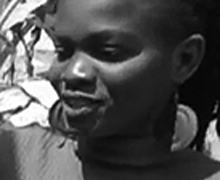The Unitarian Universalist Service Committee advances human rights through grassroots collaborations.
Stories of Hope: Danielle Neus
 You may have heard of the Papaye Peasant Movement (MPP). It’s an organization that has strengthened rural communities around Haiti through popular education and farming that is good for the earth. Danielle Neus, spokesperson for the Bright Educators of Delmas (GEAD), has brought this kind of community building to Port-au-Prince, the capital of Haiti that’s still affected by the devastation of the 2010 earthquake. Danielle is teaching people in Port-au-Prince how to grow personal gardens using recycled tires. This gives them the knowledge and tools they need to eat healthily, make a living, and build strong, safe communities in Port-au-Prince.
You may have heard of the Papaye Peasant Movement (MPP). It’s an organization that has strengthened rural communities around Haiti through popular education and farming that is good for the earth. Danielle Neus, spokesperson for the Bright Educators of Delmas (GEAD), has brought this kind of community building to Port-au-Prince, the capital of Haiti that’s still affected by the devastation of the 2010 earthquake. Danielle is teaching people in Port-au-Prince how to grow personal gardens using recycled tires. This gives them the knowledge and tools they need to eat healthily, make a living, and build strong, safe communities in Port-au-Prince.
Danielle learned the importance of community organizing and farming as a child. She spent a lot of time with her mother who was working as an “animator” (someone who works to create change in Haitian communities). She also helped her grandfather, who was a farmer. When Danielle first discovered MPP, she saw her passions coming together: people working with one another to learn not only how to grow food and eat well, but also how to build thriving communities. She signed up for an MPP training, and there she met Emmanuel Exuma, Guerna Salomon, and Adelaine Joseph — three young adults who shared her vision of strong and healthy communities. They joined together to start GEAD.
In a country that was already struggling, the earthquake made it very difficult for families to live well in Port-au-Prince. Food was hard to come by, and most of the vegetables available in the city had no nutrients because they were poorly grown or harvested. After losing their homes and access to steady food, water, and other supplies, Haitians were left with communities that were split up and they had no way to make a living within the city. Danielle immediately saw how tire gardens could benefit the people of Port-au-Prince. So she began a project with the other GEAD members to bring the idea to the city.
Now, with the help of MPP and UUSC, GEAD is working to give Haitians a way to return to the city. Their initial project trained 60 families to make tire gardens, which allowed them to grow cabbages, eggplants, spinach, and other food that’s healthy to eat and valuable to sell. And GEAD uses popular education, which invites Haitians to work together — to learn from each other, combine their resources, and find solutions that benefit the entire community. Danielle shares the GEAD motto: “We are all one, we remain one, and we will die one.”
Danielle says that, in order to achieve common goals, honest communication is everything. The group that started GEAD finds success because each member is able to speak freely about their dreams and their fears. She believes that community members must talk openly and work together, because they may all have the same goals and never know it if they don’t speak up.
The next step for GEAD is to open its own training center in the city, so that they can train more families at a faster rate. It would also allow GEAD to locally produce compost, a vital material that currently must be brought in from the countryside. Danielle believes that providing training for youth is especially important, because moving communities forward is a responsibility shared by every generation. Her goal is not just to teach her fellow Haitians to plant seeds and grow food, but also to plant the seeds of community organizing and empowerment so people may rebuild their lives.
Go deeper and take action
-
Explore how UUSC defends human rights in humanitarian crises.
-
Learn more about tire gardens in Workshop 2 of UUSC’s Beyond the Mountain Haiti curriculum.
-
Make a donation to UUSC today at uusc.org/givetoguest. UUSC does not accept any government funds or denominational support — our members and supporters sustain this vital work!